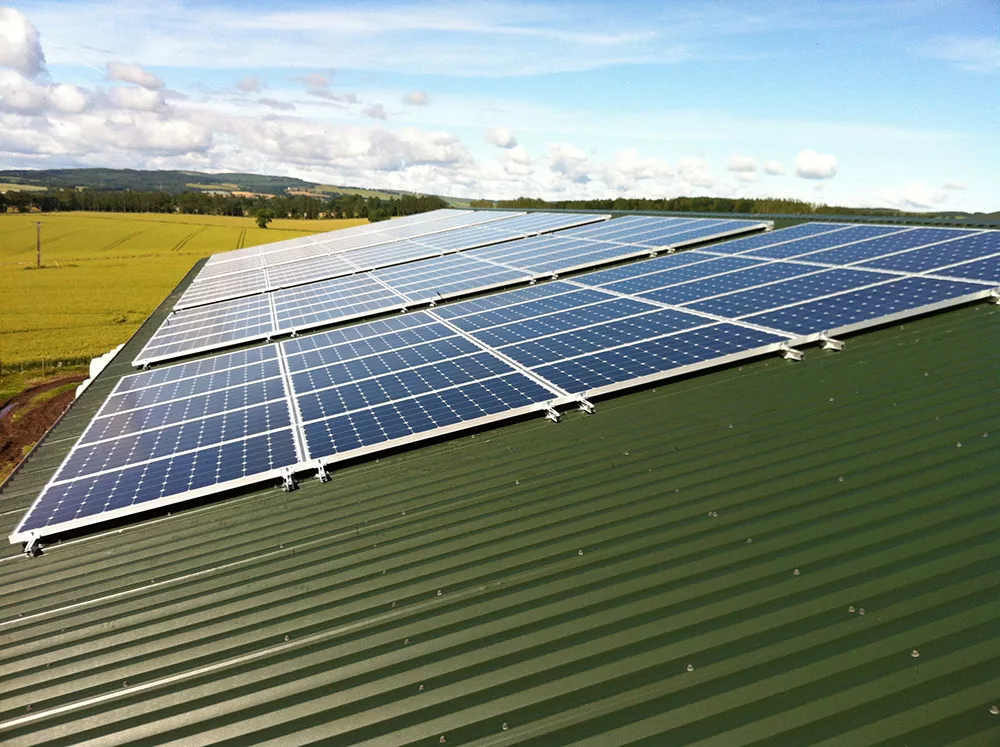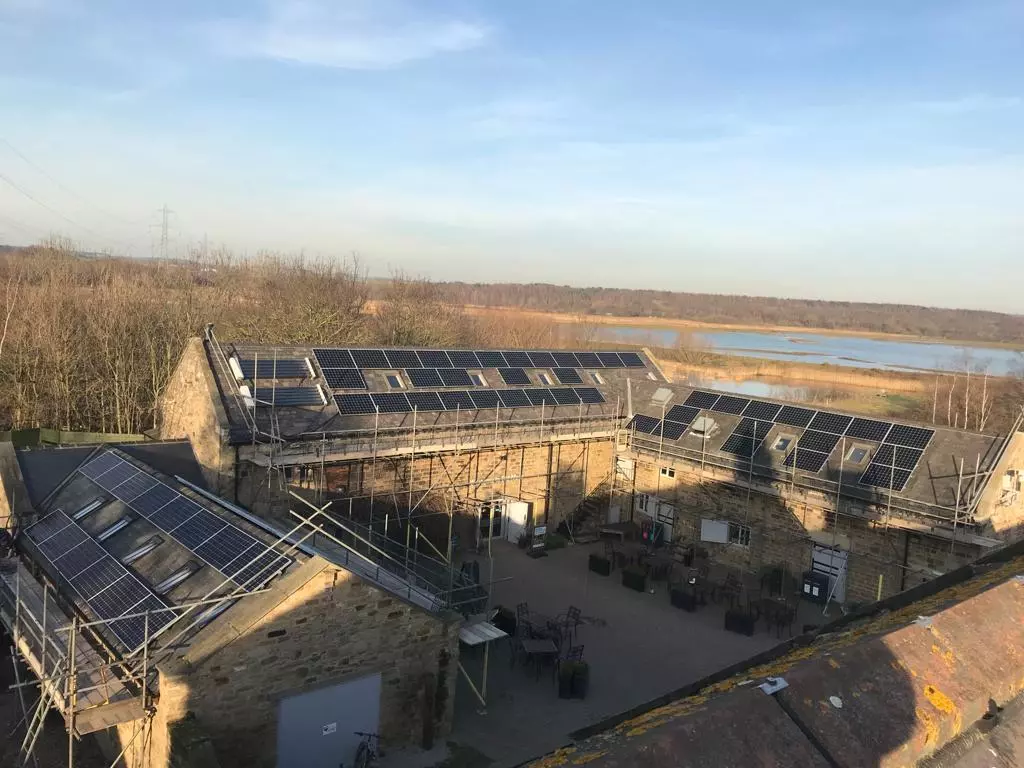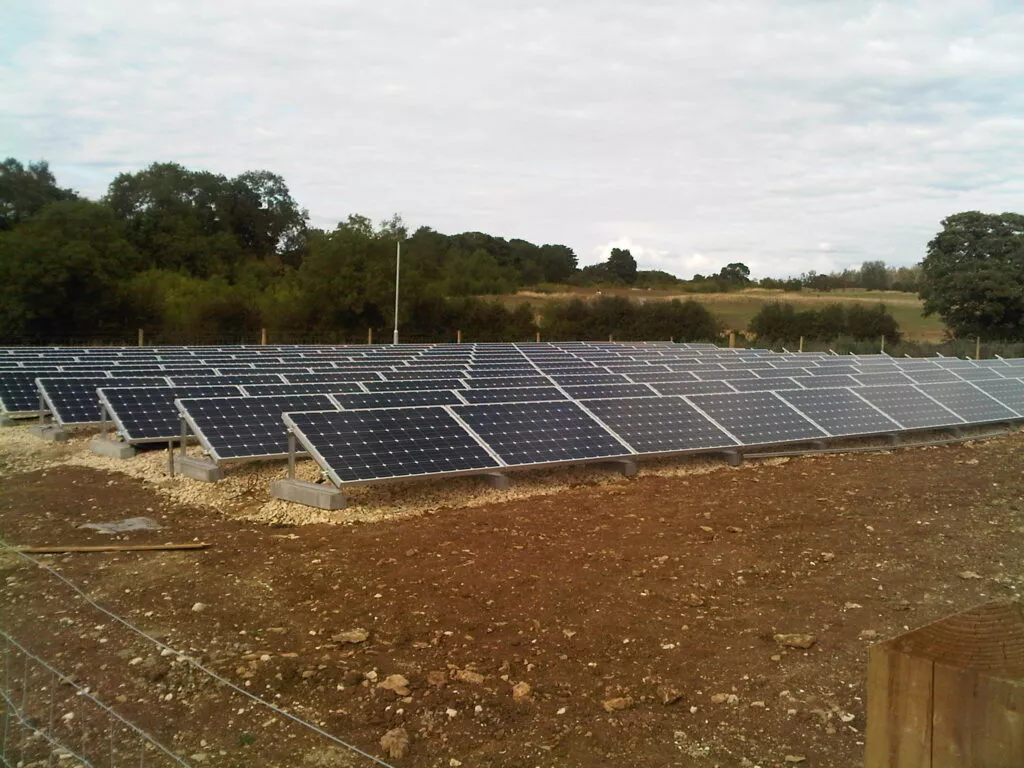Agricultural Solar Systems
As the demand for sustainable energy grows, agriculture is increasingly turning to eco-friendly solutions to reduce its environmental footprint. Agricultural solar systems present an ideal alternative by efficiently harnessing solar energy to power farm operations.
Farm buildings and unused land provide ample roof and ground space for installing agricultural solar panels, offering a straightforward solution. Solar panels for farms can reduce energy costs by up to 60%, providing a long-term, affordable energy source while decreasing dependence on fossil fuels.
solar panels for farms, landowners and agriculture sector

Excel Energy agricultural solar systems not only lower energy expenses but also boost efficiency, powering essential operations like irrigation, refrigeration warehouses, grain storage, dairy units, and chicken housing. Integrating solar panels for farms can strengthen energy resilience, reduce greenhouse gas emissions, and support global sustainability efforts.
Agricultural solar panels promote environmentally conscious practices while helping farmers maintain or increase productivity. Embracing solar energy enables farms to operate sustainably and cost-effectively, positioning them at the forefront of the green energy movement.

the benefits of Farm solar panels
Farm solar panels offer numerous benefits for agricultural operations, helping farmers and landowners save money and promote sustainability. When used in conjunction with battery storage systems, the primary advantages are the reduction in operational and electricity costs, as solar panels on agricultural land provides a long-term, cost-effective alternative to traditional energy sources.
With the potential to cut energy bills by up to 60%, farm solar panel systems guarantee complimentary electricity for over 25 years. They deliver returns exceeding 20% annually and recoup installation expenses within 4-7 years, providing an efficient and economical solution for powering various activities.
In addition to cost savings, farm solar panels ensure a reliable energy supply. This stability is crucial for operating essential equipment like irrigation systems, robotic machinery, and storage facilities, even in remote areas where access to the grid may be limited.
Call 020 3834 9440 to speak to our experts and learn more about our solar panel services for farms and agriculture.
The UK government through the Rural Payments Agency offers grants to improve farm and horticulture productivity. Since the closure of the Feed-in-Tariff (FiT) in March 2019, the commercial case for agricultural solar panels has strengthened, driven by falling technology costs, increased efficiency, and rising energy prices. In 2024, typical payback periods range from 3 to 6 years, even before considering capital allowances.
If your application is solely for solar PV equipment, the minimum grant available is £15,000 (25% of £60,000), and the maximum grant is £100,000 per business.
For both a Solar grant and a Farm Productivity grant, you must submit two separate applications, with a combined grant cap of £500,000 per business across all applications.
You must cover the remaining project costs, which can be financed through loans, overdrafts, or other eligible funds.
funding your solar farm installation
Agricultural Solar Panels Eligibility and Priorities:
Projects that enhance hen and pullet health and welfare, increase environmental sustainability, and introduce innovation are more likely to receive funding. This initiative is part of the broader Animal Health and Welfare Pathway and is focused on solar PV.
These grants are designed to help farmers improve their facilities, thereby enhancing the welfare of their livestock and supporting the transition to more sustainable and efficient farming practices.
If you have an approved project and are interested in solar panels on agricultural land, please contact us.

agriculture solar panels tailored for every farm
Excel Energy’s agricultural solar panel solutions offer a wide range of options tailored to meet the unique needs of each farm. These agriculture solar panel systems are customisable for various agrarian uses, from small family farms to large commercial operations, such as powering greenhouses, farm shops, irrigation systems, and robotic machinery. Agricultural solar systems are adaptable to the specific energy demands of each farm.
The increasing use of electric vehicles and advanced technologies like robotic milking and feeding systems will significantly raise on-site electricity consumption, making localised solar PV generation even more advantageous.
Transitioning from petrol and diesel to electric power offers additional savings and boosts the economic benefits of electrification in agriculture.
Smaller farms can benefit from rooftop solar installations, while larger operations may opt for ground-mounted arrays or solar farms, which can generate substantial energy for extensive operations.
With Excel Energy, farmers gain access to scalable, renewable energy solutions. This scalability not only reduces costs but also provides a sense of security, ensuring that farmers can meet the growing demands of modern agriculture without compromising on energy independence.
solar panels for farm buildings a comprehensive guide
As energy costs rise and environmental concerns grow, solar power has become an attractive solution for farmers looking to cut costs and reduce their environmental impact. Solar panels for farm buildings offer an efficient, eco-friendly way to generate electricity, helping farmers reduce energy bills, achieve energy independence, and support sustainability initiatives. This comprehensive guide provides an in-depth overview of installing solar panels on farm buildings, covering site assessment, panel selection, maintenance, and the long-term financial and environmental benefits of solar energy.
the installation process of solar panels on farm buildings
Site Assessment
Before installing agricultural solar panels, a thorough site assessment is essential to determine whether your farm buildings are suitable and safe for solar power and to ensure optimal system performance.
Roof Condition
Since agriculture solar panels typically last 25-30 years, your roof should be in good condition before installation. If your roof requires repairs or replacement, it’s best to address these issues beforehand to avoid extra costs or complications down the line.
Roof Size and Orientation
The roof’s size and its orientation relative to the sun directly affect agriculture solar panel efficiency. South-facing roofs are ideal because they receive the most sunlight, but east- or west-facing roofs can still perform well if correctly sized. Ensure there’s enough space for panels and that the structure can support their weight.
Electricity Usage
Evaluate your farm’s current and projected electricity needs to design an agriculture solar system that meets your energy requirements. An energy audit can help identify your usage patterns and guide system sizing, especially if you're planning to electrify more farm operations in the future.
Shading
Shading from nearby trees, silos, or other structures can reduce the efficiency of solar panels on farm buildings. Conduct a shading analysis to find the best position on your buildings for maximum sun exposure throughout the day.
Design and Propose the Appropriate PV Solution
Compile a complete proposal where we create an overview of the solar farm installation project, detailed system design and layout Outline with the product and material specifications, the cost breakdown and financial analysis and timeline for the installation process
choosing the right farm solar panels
Selecting the right type of solar panels for farm buildings is critical to maximising performance and value. There are three main types of solar panels commonly used in agricultural settings:
Monocrystalline Panels
Known for their high efficiency and long lifespan, monocrystalline panels are ideal for farms with limited roof space but higher energy demands. Though they are more expensive, they offer greater energy output in smaller spaces.
Polycrystalline Panels
These panels are slightly less efficient than monocrystalline panels but are more affordable. They work well for farms with larger roof areas where more panels can be installed to meet energy needs.
Thin-Film Panels
Thin-film panels are lightweight and flexible, making them a good option for unconventional roof shapes. However, they are less efficient than crystalline panels and require more installation space.
In addition to selecting the type of agricultural solar panel, consider the following components:
Inverter Quality:
Inverters convert the direct current (DC) generated by solar PV panels into alternating current (AC), which powers farm equipment. Choose reliable inverters with long warranties for optimal system efficiency.
Durability and Warranties
Solar panels and inverters come with various warranty options, typically 20-30 years for panels and 5-15 years for inverters. Select solar PV panels designed to withstand harsh weather conditions commonly experienced on farms.
Solar panels for farm buildings Installation process
Once the site is assessed and the appropriate agricultural solar system is chosen, the installation process can begin. It generally includes:
Design and Planning
Excel Energy, a professional solar installer, will create a customised solar system tailored to your site assessment and energy audit. The plan will outline the required number of panels, the type of inverter, and the feasibility of incorporating battery storage.
Permitting and Approvals
You’ll need to secure the necessary permits from local authorities. Depending on your location, you may also need planning permission, especially for large or ground-mounted systems.
Installation
As the solar installer, Excel Energy applies for your DNO (Distribution Network Operator), mounts the panels on your farm buildings and connects them to the inverter and electrical system. Installation times vary, but most projects take from a couple of weeks to a few weeks.
Grid Connection
If your system is tied to the grid, the final step is connecting your solar panels to the local utility grid. With grid-tied systems, you can take advantage of net metering, where excess energy generated by your solar panels is sold back to the grid, further reducing your energy costs and creating an income stream.
Commission and Final Inspection
This ensures the agricultural solar system has been programmed accordingly and is ready to operate as per design parameters before it becomes fully operational.
Maintenance of solar panels for farm buildings
One of the key benefits of installing solar panels for farm buildings is their minimal maintenance requirements due to technological advancements. Agricultural solar panels have no moving parts, so they rarely need repairs. However, a few regular tasks will ensure optimal performance is achieved.
Cleaning
Dust, dirt, and bird droppings can reduce the efficiency of solar panels. Rain typically washes away debris, but during dry seasons, manual cleaning with water or sprinkler water systems may be necessary.
System Inspection
An annual inspection by Excel Energy can help identify any potential issues early on, such as malfunctioning inverters, error codes or damage to the panels.
Inverter Maintenance
Inverters typically have shorter lifespans than solar panels and may need to be replaced after 10-15 years. Monitoring the inverter’s performance helps catch issues and alert the end user before they affect the entire system.
Benefits of solar panels for farm buildings?
Solar panels for farm buildings provide substantial long-term financial savings, making them a wise investment. Beyond the financial gains, they also offer significant environmental benefits:
Energy Savings
Solar PV panels generate electricity on-site, reducing or even eliminating energy bills. This is especially valuable for energy-intensive farms, where electricity costs can be a significant portion of operating expenses.
Protection from Volatile Energy Prices
Solar energy provides a hedge against future energy price hikes. By generating your own power, you gain control over your energy costs and reduce reliance on external energy suppliers.
Return on Investment (ROI)
While the initial investment in solar panels can be high, the system often pays for itself within 4 to 7 years through energy savings and government incentives. After the payback period, your farm enjoys nearly free electricity for decades.
Government Incentives
The UK Government offers subsidies, grants, and tax incentives for solar PV installations. For example, programs like the Smart Export Guarantee (SEG) allow farmers to sell surplus energy back to the grid, providing an additional revenue stream.
Carbon Emission Reduction:
Solar energy is a clean, renewable power source without greenhouse gas emissions. By transitioning to solar panels on agricultural land, your farm not only reduces its carbon footprint but also contributes to carbon offsetting, supporting global efforts to combat climate change.
Sustainable Farming
Utilising solar panels on farms aligns with the principles of sustainable agriculture. It helps conserve natural resources, protect biodiversity, and maintain a clean environment for future generations.
Resource Conservation
Solar power uses no water and produces no pollution, unlike fossil fuel-based energy. This contributes to the conservation of water and other vital resources on your farm.
Conclusion
Investing in solar panels on farms is a wise financial decision and a way to enhance your farm’s environmental stewardship. If you’re considering solar panels for your farm Call Excel Energy to book a FREE no no-obligation consultation.
solar farm installation steps summary to powering your agriculture
Partnering with Excel Energy guarantees a customised and efficient solar farm installation that aligns with your agricultural energy needs. Installing a solar PV system for agricultural operations is a smart strategy to lower energy costs and promote sustainability. Here are the essential steps to a successful solar farm installation:
Initial Consultation
Assess your farm's energy needs and potential solar farm site to ensure viability.
Installation
Experienced professionals install solar panels, inverters, and other equipment according to the design plan and parameters.
Site Assessment
Conduct a thorough evaluation of the roof tops or land, including sunlight exposure, shading, infrastructure required and available space
Inspection, Programming and Activation
Complete a final inspection and programming to ensure everything functions properly and in accordance with design before activation.
Design and Planning
Develop a customised solar PV farm design that accounts for energy usage, system size, layout, and customer goals.
DNO Witnessing and System Energisation
Connect the system to the electrical AC distribution boards, eye witnessing with DNO where required. Once commissioning documents are signed an export MPAN number will be issued allowing you to offset energy costs or sell excess energy.
Permits and Approvals
Secure necessary permits and regulatory approvals to proceed with the installation.
Maintenance and Support
Agricultural solar systems require minimal maintenance, but regular inspections are crucial for peak performance and longevity. Excel Energy provides a 5-year online monitoring service and maintenance packages, including panel cleaning, system checks, and troubleshooting support.
Why Excel Energy is your best partner for agricultural solar systems
Partnering with Excel Energy guarantees a customised and efficient solar farm installation that aligns with your agricultural energy needs. Installing an agricultural solar system for farming operations is an intelligent strategy to lower energy costs and promote sustainability. Here are the essential steps to a successful solar farm installation:
Expertise in Tailored Agricultural Solar Systems
Excel Energy specialises in designing and implementing agricultural solar systems that align perfectly with your farm’s specific requirements. Our team of experienced professionals conducts thorough assessments to understand your energy consumption patterns and operational demands. By customising solar panel PV solutions, they ensure maximum efficiency and a significant reduction in energy costs whilst providing a high yield investment.
Commitment to Supporting the Agricultural Sector
Understanding the unique challenges faced by farmers, Excel Energy provides sustainable renewable energy solutions that enhance productivity and promote environmental stewardship. They offer comprehensive services, from initial consultation and design to installation and ongoing maintenance, ensuring a seamless transition to renewable energy.
Proven Track Record of Successful Installations
With a history of successful installations, Excel Energy has built a reputation for reliability and excellence in the field of agricultural solar systems. Their portfolio showcases a diverse range of projects tailored to various agricultural needs, demonstrating their ability to deliver effective and efficient solar solutions that stand the test of time.
Dedication to Customer Satisfaction
Customer satisfaction is at the heart of Excel Energy’s mission. We prioritise clear communication and transparency throughout every project phase. Our dedicated support team is always available to address concerns, provide updates, and ensure your agricultural solar panel system operates at peak performance. This unwavering commitment has earned Excel Energy the trust and loyalty of numerous clients in the agricultural sector.
We are a trusted commercial solar system provider for farms and agricultural land. If you are interested in working with us, give us a call on 0203 834 9440.
Invest in Agricultural Solar Systems for a Sustainable Future
Investing in agricultural solar systems is a smart decision for farms looking to reduce energy costs, improve sustainability, and boost operational efficiency. Solar panels for farms offer significant financial and environmental benefits, including long-term energy savings, reduced carbon emissions, and enhanced energy independence. Solar systems are valuable assets to modern agriculture with their ability to power essential farm operations, such as irrigation, refrigeration, and machinery.
Excel Energy’s expertise in delivering tailored agricultural solar systems ensures that farms of all sizes receive customised solutions to meet their unique energy needs. Our commitment to sustainability, customer satisfaction, and high-quality installations makes us the best partner for transitioning to renewable energy. Farmers can enhance productivity, reduce their carbon footprint by choosing Excel Energy, and take a leading role in the green energy movement.
We have finance options with our power purchase agreement with no large upfront costs. Find out more.
Attain a robust return on investment (ROI).
A standard agicultural solar system guarantees complimentary electricity for over 25 years, delivering returns exceeding 20% annually and recouping installation expenses within 4-7 years.
Protect your farming business from power shortages.
Safeguard your business against power shortages by generating and storing your own energy. Decrease dependence on the National Grid, shielding your business from potential rationing and brownouts.
Speak to our team and we will help you work out if you will be able to benefit from our PPA. Call us on 0203 834 9440.
